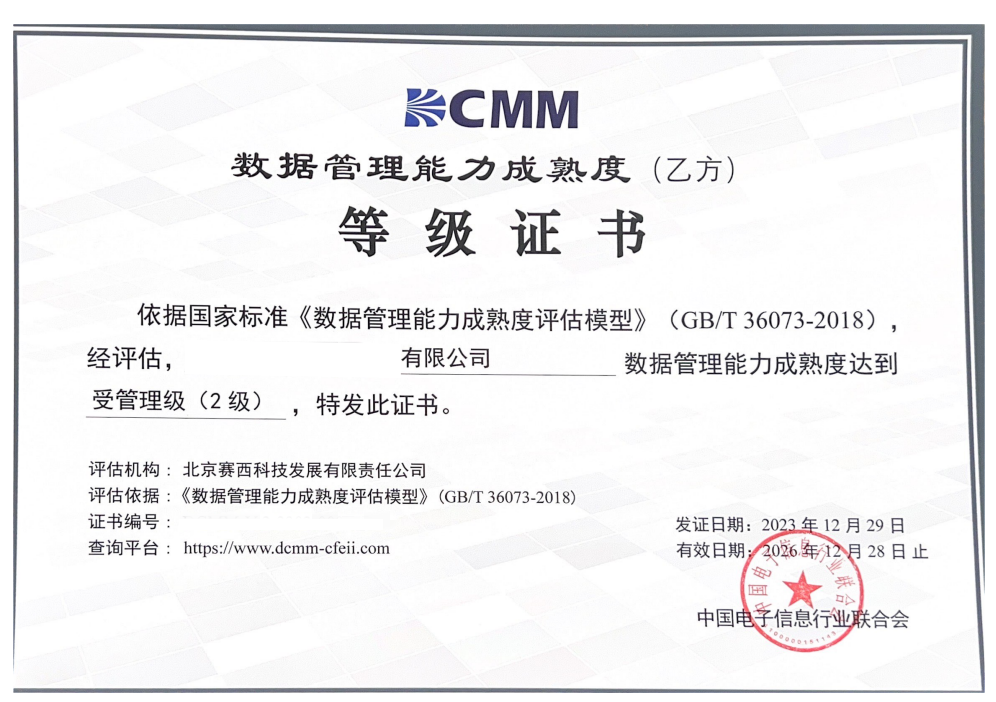
 Professional services are guaranteed
Professional services are guaranteed One on one full process guidance
One on one full process guidance Efficient and fast experience
Efficient and fast experienceDCMM was developed under the guidance of the Ministry of Industry and Information Technology and jointly developed by the China Electronic Information Industry Federation and industry university research institutions. It was officially released in 2018. This standard integrates international data management concepts (such as DAMA DMBOK) with Chinese enterprise practices, aiming to use a systematic evaluation model to help enterprises diagnose data management shortcomings, plan capability improvement paths, and ultimately achieve data-driven business innovation and value transformation.
Core Background
Industry demand: In the era of digital economy, data has become a core production factor, but most enterprises face problems such as data silos, low quality, and security risks.
Policy Promotion: In 2022, the Ministry of Industry and Information Technology released the "National Standard Implementation Work Plan for Enterprise Data Management", which clearly identified DCMM as an important tool for building enterprise data capabilities.
The DCMM standard revolves around data lifecycle management, dividing enterprise data capabilities into 8 core competency areas and 28 key process areas, and setting five maturity levels (initial level, managed level, robust level, quantitative management level, optimization level), constructing a complete evaluation system:
1. Eight major competency domains
DCMM defines eight core competency areas for data management, covering the full lifecycle management of data:

2. Five level maturity model
DCMM certification is divided into five levels, from low to high:
Initial Level (Level 1) → Managed Level (Level 2) → Robust Level (Level 3) → Quantitative Management Level (Level 4) → Optimization Level (Level 5)
The requirements for data management capabilities, organizational size, and business maturity of enterprises are gradually increasing at different levels
(I.) Applicable enterprise types
? Data intensive enterprises: high data dependent industries such as finance, communication, Internet, and medical care.
? Digital transformation enterprises: traditional enterprises such as manufacturing and retail seeking data-driven business growth and process optimization.
? Government and public institutions: the main body of smart city and government big data platform construction.
? Core enterprises in the supply chain: leading enterprises that need to collaborate with upstream and downstream to achieve data interconnectivity.
(II.) Core values
1. Enhance data management capabilities
Systematically diagnose the eight major areas of weaknesses in enterprise data strategy, governance, quality, etc., establish a scientific management system, and achieve standardized management of the entire data lifecycle.
2. Obtain policy dividends
Multiple local governments provide up to 500000 yuan in funding subsidies, and certified enterprises can be given priority to participate in digital transformation pilot projects and receive qualification points in bidding.
3. Enhance market competitiveness
Authoritative certification endorsement enhances customer trust, especially in high compliance fields such as finance and government affairs, helping enterprises expand business scenarios and innovate business models.
4. Cost reduction, efficiency improvement, and risk control
Optimize data architecture to reduce redundant investment and lower operating costs by 20% -30%; Improve security mechanisms to ensure compliance and avoid data leakage risks.
5. Establish a benchmark position in the industry
High level certified (4-5 levels) enterprises can lead the development of industry standards, seize the opportunity in the data element market, and strengthen their ecological discourse power.
(I.) Basic qualification requirements
(1) Enterprise entity qualification
Having independent legal personality (if it is a branch, a data ownership certificate must be issued by the higher-level legal entity);
The registered address must be within the declared area (such as Shaanxi Province, Xi'an City, etc.) and the business must have been continuously operating for at least 1 year (some areas require at least 2 years);
Not included in the previous national or provincial DCMM pilot list.
(2) Business compliance
There have been no major violations or bad credit records in the past three years;
The financial condition is good, and financial audit reports for the past three years are required (e.g. Level 2 requires annual revenue of ≥ 1 million yuan, Level 3 requires annual revenue of ≥ 10 million yuan).
(3) Fundamentals of Data Management
A preliminary data management system has been established, covering at least 4 core competency areas (such as data governance, security, quality, etc.);
Proof of software or procurement contract with data management tools such as data governance platforms and quality monitoring systems.
(II.) Corresponding application conditions for each level

Enterprise Qualification Category:
Commitment Letter
Copy of Business License
Certificate of Independent Legal Person Qualification
Financial and personnel certification:
Last year's financial audit report
Social security payment records for the past 3 months
Basic proof of data management:
Data declaration file
Data management system file
Data management related tool procurement contract or software copyright certificate

(III.) Bonus point materials (improving evaluation pass rate)
1. Qualification category
DCMM Data Manager Certificate.
National Big Data System Quality Inspection Report (demonstrating tool compliance).
2. Technical category
Proof of participation in invention patents or group standards in the field of data.
Testing reports for data governance related products (such as those issued by third-party laboratories).
(IV.) Precautions
Authenticity of materials: False materials will result in authentication failure and may be included in the credit blacklist.
Policy update: Some local governments provide funding subsidies for high-level certification (such as Shenzhen's reward of 500000 yuan for level four and above), and consultation is required in advance.
Validity and maintenance: The certificate is valid for 3 years and requires annual supervision and evaluation, as well as submission of updated materials.
The DCMM evaluation process is mainly divided into three stages: evaluation preparation, formal evaluation, result evaluation, and certification. The overall cycle is usually 3-6 months (specific duration varies depending on the size of the enterprise, target level, and rectification efficiency)




Wechat ID:Siterui888888
Add a wechat friend to get free plans and quotations


 Contact
Contact
號.jpg)



 定制化解決方案
定制化解決方案 專業(yè)咨詢指導(dǎo)
專業(yè)咨詢指導(dǎo) 透明化服務(wù)
透明化服務(wù) 長期顧問式合作
長期顧問式合作